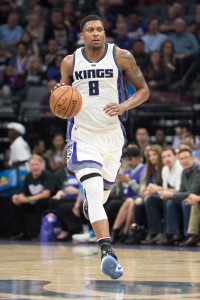The 2016/17 campaign is entering its tenth week and Hoops Rumors is examining the fantasy basketball landscape in order to help you dominate the competition. Check back weekly for more fantasy basketball analysis.
Orlando’s Ace Off The Bench
The Magic’s offseason was filled with change, but the team planned on bringing back Elfrid Payton–their incumbent starting point–in hopes that he would continue to progress as a player and give the team some consistency. Payton struggled to begin the season, which provoked the organization to make another change: moving him to the bench.
The move has been mildly successful for the team, as Orlando owns a record of 9-8 since coach Frank Vogel re-adjusted the line-up, but it has brought even more success for Payton. Since moving to the second unit, the point guard is making 51.4% of his shots, up from the 43.0% he was making as a starter, and he’s averaging more points and assists per game than he was before.
Payton has always produced in the steals and assists categories, but his field goal percentage was detrimental to his value. Playing against opposing teams’ back-up point guards for portions of each game has allowed him to boost his offensive efficiency, similar to what Eric Gordon is experiencing in Houston.
He’s been particularly impressive over his last five games. He’s scoring 17.2 points per game on 58.3% shooting while adding 5.8 assists and a steal per game over that span. However, it’s worth noting that the team was missing Evan Fournier for two of those games, which led to a bigger role for the point guard.
Payton has become a fantasy asset and he should continue to be useful as long as his role doesn’t change too much. The team reportedly has interest in dealing him, as it may look to make even more changes, and if he’s dealt, his value will be dependent on what type of situation he’s looking at. If the Magic give Payton the starting spot back, or he’s dealt to a team that’s looking for a starter, his production is likely to be less efficient and his fantasy stock is likely to drop. Until then, enjoy his production and if he’s not owned in your league (available in over 30% of ESPN leagues), add him before Wednesday’s match-up against the Hornets.
Here’s more fantasy analysis and notes from around the league:
- T.J. Warren, a player whom I wrote about earlier in the month, is still available in over half of ESPN leagues and that number should be much lower. The Suns are second in the league in pace this season, but the team is playing even faster when Warren is in the line-up. With him on the floor, the team is seeing nearly four more possessions per 48 minutes than when he sits. Before he was sidelined with a head injury, the small forward was a top-10 fantasy player at his position, in part because of the speed at which the team plays, and he’s starting to regain his form again.
- Last week, Stan Van Gundy threatened that changes were coming for the Pistons. Since then, the coach moved Tobias Harris to the bench and it has helped the forward’s production. He’s scoring 23.5 points per game while shooting 53.6% from the field over his last two contests.
- Van Gundy inserted free agent addition Jon Leuer in the starting line-up and the big man is also enjoying success. He’s shooting 51.1% from the field this season and he’s making 89.1% of his foul shots, a spectacular number for a big man. The power forward is available in nearly 70% of ESPN leagues.
- The Mavericks signed Pierre Jackson earlier today. While the point guard is a scoring machine, his defense may keep him from seeing many minutes for the club. He’ll need to improve on that end of the floor if he is going to carve out a meaningful role with Dallas and he shouldn’t be on the fantasy radar until that happens.
